Lucila Rubio de Laverde (1908-1970) [1] was a Colombian socialist and one of the leading suffragettes in her country. She was also a teacher and the first woman to present a demand for the vote to the President of Colombia.
Lucila Rubio de Laverde (1908-1970) [1] was a Colombian socialist and one of the leading suffragettes in her country. She was also a teacher and the first woman to present a demand for the vote to the President of Colombia.
Rubio was born in Facatativá, Colombia. [1] She began her activism as early as the 1930s, when she fought for the economic rights of women. She pushed for legislation granting pre-nuptial agreements, was a proponent of co-habitation and she spoke against the Church's treatment of women. [2]
By the 1940s, Rubio had become one of the leaders of Colombia's women's rights movement and a most important suffragette. [3] [4] She was one of the founders of The Unión Femenina de Colombia (Women's Union of Colombia) (UFC), created in Bogota in 1944. The UFC was one of the most important women's organizations during this time. It spread to other cities and promoted voting rights, literacy of women, and rights of citizens. Rubio de Laverde served as president of the organization [5] and was also president of the Alianza Femenina de Colombia (Women's Alliance of Colombia), founded the same year. [4] In 1944, [2] the UFC collected more than 500 signatures [6] pressing for the vote and Rubio de Laverde presented them to President Alfonso López Pumarejo, demanding women's right to vote. [7]
She wrote for Agitación Femenina [8] from 1944-1946. [9] Rubio de Laverde wrote about social problems in Colombia from a feminist perspective, collaborating in newspapers and magazines such as Pax et Libertas, Verdad and Dominical. She founded the College Froevel, which operated for eight years, and gave lectures at the School of Social Service, the Women's Institute of the Free University and the Colegio Mayor de Cundinamarca. [4]
In Colombia, she attended both the 1945 suffrage conference and the 1946 conference where she warned that women should not limit themselves to their homes but should be fully participating citizens. [10] She also attended the Primer Congreso Interamericano de Mujeres held in Guatemala City, Guatemala in 1947 [11] and presided over the final session where the resolutions were drafted. [12] She attended the Second Congress of Women of the Americas, and attended the International Council of Women's 1960 meeting in Warsaw. In 1962, she attended the 15th Congress of the League of Peace and Freedom [11] held in San Francisco and participated in the debates on nuclear testing. [13] In 1963, Rubio attended the pilgrimage Women for Peace in Rome and Geneva. [11]
Rubio married Eduardo Laverde, a "man of letters". [4]

As established in the Colombian Constitution of 1991, women in Colombia have the right to bodily integrity and autonomy; to vote ; to hold public office; to work; to fair wages or equal pay; to own property; to receive an education; to serve in the military in certain duties, but are excluded from combat arms units; to enter into legal contracts; and to have marital, parental and religious rights. Women's rights in Colombia have been gradually developing since the early 20th Century.
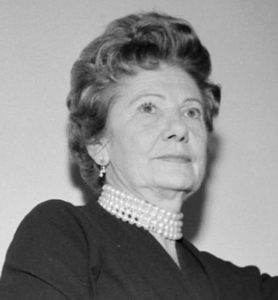
Ofelia Uribe de Acosta was a Colombian suffragist.

Elisa Hall de Asturias was a Guatemalan writer and intellectual. In the 1930s, she wrote a book Semilla de mostaza that became the source of controversy for nearly 70 years. Anti-feminist biases at the time that she wrote led to the conclusion that she could not have written the book, which had become a mainstay of Guatemala's literary heritage. In 2011 and 2012, new research into the controversy verified that she was the author of the work.
The Primer Congreso Interamericano de Mujeres was a feminist meeting held from 21 to 27 August 1947 in Guatemala City, Guatemala. It was called together by the Women's International League for Peace and Freedom (WILPF) and hosted by the Unión Democrática de Mujeres of Guatemala. This organization had been formed by Angelina Acuña de Castañeda, Berta Corleto, Elisa Hall de Asturias, Gloria Menéndez Mina de Padilla, Rosa de Mora, Irene de Peyré, and Graciela Quan immediately following the Guatemalan 1944 coup d'état to push for recognition of women's civil rights.
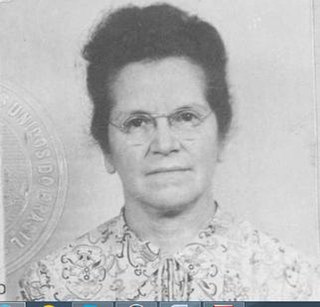
María Rivera Urquieta was a Chilean professor and feminist. She was one of the founding members of the Pro-Emancipation Movement of Chilean Women. She was a lecturer for the Chilean Federation of Feminine Institutions and led one of the conference meetings at the Primer Congreso Interamericano de Mujeres held in Guatemala City, Guatemala in 1947.
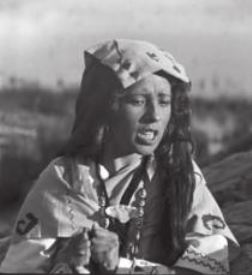
Ana Rosa Tornero (1907–1984) was a Bolivian writer, journalist, teacher, social reformer and a feminist. She published the first feminist magazine in Bolivia and was one of the founders of the first feminist organization in the country.

Eloísa García Etchegoyhen (1921-1996) was a pioneering Uruguayan educator and disability rights activist. She not only created the first educational facilities in Uruguay to teach those with disabilities, but she developed job placement programs and parent support groups to help children integrate into the larger society. She spearheaded training for teachers and psychologists leading to the creation of research programs into the cause of intellectual disability and led a public awareness campaign to encourage acceptance of disabled people by their families and communities. She began the first school for students with multiple disabilities and began the first pre-school for early assessment and intervention for disabled children in Uruguay. She brought the Special Olympics to Uruguay and worked throughout Latin America and the Caribbean for inclusive policies for disabled citizens.
Carmen Sánchez de Bustamante Calvo was a Bolivian woman's rights advocate and the first Bolivian woman to serve on the OAS's Inter-American Commission of Women. She also served on the organizing committee from the Women's International League for Peace and Freedom for the Primer Congreso Interamericano de Mujeres. A Bolivian women's rights organization, the Carmen Sánchez Bustamante Foundation was named in recognition of her work to promote women's rights.

María Odilia Castro Hidalgo (1908–1999) was a Costa Rican teacher, communist and feminist. She founded the parent organization which would become the National Association of Educators. Exiled for her communist activities after the Costa Rican Civil War, Castro later returned and founded several social welfare programs. She taught for 32 years and served as a nurse in Costa Rica and Venezuela. Castro was admitted to the Costa Rican National Institute for Women (INAMU)'s Gallery of Women in 2006.
Graciela Quan Valenzuela was a Guatemalan lawyer and activist. She campaigned for women's suffrage, writing a draft proposal for Guatemala's enfranchisement law. She was also a social worker, adviser to the President of Guatemala, delegate to the United Nations and the President of the Inter-American Commission of Women.
Enriqueta de Landaeta was a Venezuelan professor and teacher who was an active suffragette and proponent for women's education. From 1936 to 1938 she was the Director of the Escuela Federal Jesús María Sifontes in Guaicaipuro, Venezuela, which was one of the first primary schools opened for girls in 1917. By 1947 she was in Caracas and teaching World History and Geography and American History, which she continued until at least 1955. In 1959, with the founding of Liceo Santiago Key Ayala, Landaeta became assistant principal. The school, located in Caracas was one of the first institutions to offer Bachelor of Science degrees to women. In 1947, Landaeta attended the Primer Congreso Interamericano de Mujeres which was a women's conference sponsored by the Women's International League for Peace and Freedom (WILPF) to promote women's dialogue on world affairs and promote recognition of women's civil rights.

Corina Rodríguez López (1895-1982) was a Costa Rican educator, writer, feminist and occasional sculptor. She was the founder of the Casa del Niño and the Temperance League of Costa Rica, as well as a feminist and suffragette. She was twice exiled for her outspokenness on the treatment of women and children and her political views. She taught school in both Costa Rica and Panama and wrote articles for newspapers and magazines criticizing both national and international political policies. When she returned from exile in Panama, she worked as a housing advocate for poor families in the southern neighborhoods of San José. She was inducted into the Costa Rican Gallery of Women in 2007.
Rosa Amelia Guzmán was a Salvadoran journalist, feminist and suffragette. Her 1950 speech to the Constituent Assembly was instrumental in women gaining, not just the right to vote, but the rights of citizenship on 14 September. She was one of the first four women elected to serve in the Legislative Assembly of El Salvador.
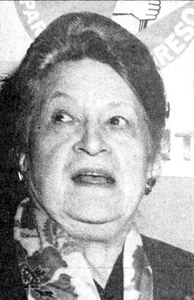
María Currea Manrique was a Colombian feminist, suffragist, politician, nurse and journalist. She was instrumental in pressuring for laws in Colombia which recognized women's right to citizenship, education, and enfranchisement. She was honored as the 1960 "Women of the Americas" by the Organization of American States and received many awards and honors during her lifetime. She was posthumously honored with an award distributed bearing her name each March 8 in honor of International Women's Day to the Colombian woman who has excelled in promoting women's rights in her community.
Luz Amorocho Carreño was the first Colombian woman to graduate as an architect. She presented one of the first urban plans for Bogotá and worked on both public and private buildings in Bogotá throughout her career. Between 1966 and 1988, she served as the Director of the Planning Department of the National University of Colombia and spent a decade documenting the history of the buildings on the campus of the university.
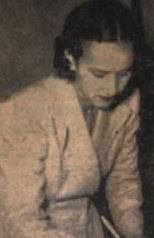
Rosa Rojas Castro was the first Colombian woman to obtain a doctorate and first woman lawyer in the country. She is remembered as a pioneer who opened higher education and professional careers to women.

Gloria Menéndez Mina was a Guatemalan writer and women's rights activist who was involved in the women's suffrage movement in Guatemala. One of the first women to participate in journalism in the country, she directed the magazines Mujer and Azul. In her later career, she served as a press attaché in Mexico and was known for her book, Francisco Javier Mina, héroe de México y España.
Union Femenina de Colombia (UFC), was a Colombian women's rights organization, founded in 1944. Alongside the Alianza Femenina, it was one of the two big women's organizations campaigning for women's suffrage in Colombia.
Magdalena León is a Colombian feminist sociologist specializing in social research and women's studies. Trained with the founders of Colombian sociology, Orlando Fals Borda and Camilo Torres Restrepo, she transferred the rhetorical and discursive framework to the analysis of empirical reality using the survey, systematization, and data analysis to learn the reality on the ground, not only of Colombia but also from Latin America.

Florence Thomas is a French-Colombian social psychologist and feminist academic. She was a co-founder of the Programa de Estudios de Género, Mujer y Desarrollo at the National University of Colombia. She is also a journalist for the newspaper El Tiempo. Thomas was honored with the Premio Nacional de Periodismo Simón Bolívar in 2005. In 2017, Thomas was decorated as a Knight in France's Legion of Honour.